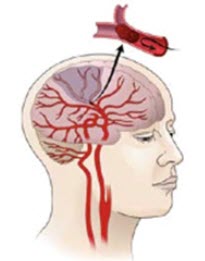When a blood vessel that carries blood to the brain become blocked by a blood clot, we call this an ischemic stroke. Because of the blockage, blood is prevented from reaching the brain.
Roughly 85% of all diagnosed strokes are ischemic strokes.
Risk factors
The main risk factor for ischemic stroke is high blood pressure.
Embolic stroke
 An embolic ischemic stroke is caused by a blood clot (or plaque fragment) that was formed somewhere else in the body and then reached the brain. The heart is a common location for such items to form.
An embolic ischemic stroke is caused by a blood clot (or plaque fragment) that was formed somewhere else in the body and then reached the brain. The heart is a common location for such items to form.
The clot can travel through the body without causing any symptoms as long as there is enough space for it. When an embolic ischemic stroke happens it is because the clot has traveled to the brain and then reached a blood vessel where there isn’t enough space for the clot. The clot blocks the passage of blood through the vessel, causing a stroke.
Atrial fibrillation and embolic stroke
Atrial fibrillation (Afib) is a known risk factor for embolic stroke. Roughly 15% av diagnosed embolic strokes occur in people with atrial fibrillation. Atrial fibrillation is a quivering or irregular heartbeat (arrhythmia). It increases the risk of blood clots, stroke and heart failure.
Thrombotic stroke
A thrombotic stroke is caused by a blood clot that formed inside one of the arteries supplying with brain with blood.
Thrombotic strokes can be divided into two categories:
- Strokes caused by large vessel thrombosis.These strokes occur in the brain’s larger arteries. Most cases are brought on by a combination of long-term atherosclerosis and rapid blood clot formation. (In a person with atherosclerosis, plaque builds up inside the arteries.) High cholesterol levels is a known risk factor for this type of stroke.
- Strokes caused by small vessel disease.These strokes occur when the blood flow to a very small arterial vessel is blocked. A high blood pressure is a known risk factor for this type of stroke.
